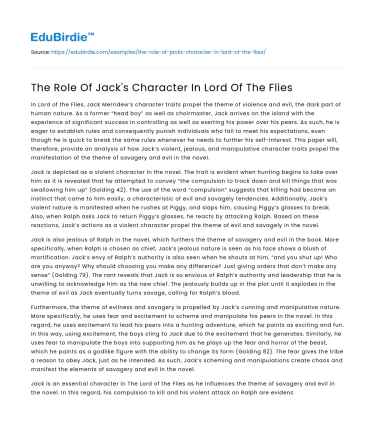In Lord of the Flies, Jack Merridew’s character traits propel the theme of violence and evil, the dark part of human nature. As a former “head boy” as well as choirmaster, Jack arrives on the island with the experience of significant success in controlling as well as exerting his power over his peers. As such, he is eager to establish rules and consequently punish individuals who fail to meet his expectations, even though he is quick to break the same rules whenever he needs to further his self-interest. This paper will, therefore, provide an analysis of how Jack’s violent, jealous, and manipulative character traits propel the manifestation of the theme of savagery and evil in the novel.
Jack is depicted as a violent character in the novel. The trait is evident when hunting begins to take over him as it is revealed that he attempted to convey “the compulsion to track down and kill things that was swallowing him up” (Golding 42). The use of the word “compulsion” suggests that killing had become an instinct that came to him easily, a characteristic of evil and savagely tendencies. Additionally, Jack’s violent nature is manifested when he rushes at Piggy, and slaps him, causing Piggy’s glasses to break. Also, when Ralph asks Jack to return Piggy’s glasses, he reacts by attacking Ralph. Based on these reactions, Jack’s actions as a violent character propel the theme of evil and savagely in the novel.
Save your time!
We can take care of your essay
- Proper editing and formatting
- Free revision, title page, and bibliography
- Flexible prices and money-back guarantee
Jack is also jealous of Ralph in the novel, which furthers the theme of savagery and evil in the book. More specifically, when Ralph is chosen as chief, Jack’s jealous nature is seen as his face shows a blush of mortification. Jack’s envy of Ralph’s authority is also seen when he shouts at him, “and you shut up! Who are you anyway? Why should choosing you make any difference? Just giving orders that don’t make any sense” (Golding 79). The rant reveals that Jack is so envious of Ralph’s authority and leadership that he is unwilling to acknowledge him as the new chief. The jealously builds up in the plot until it explodes in the theme of evil as Jack eventually turns savage, calling for Ralph’s blood.
Furthermore, the theme of evilness and savagery is propelled by Jack’s cunning and manipulative nature. More specifically, he uses fear and excitement to scheme and manipulate his peers in the novel. In this regard, he uses excitement to lead his peers into a hunting adventure, which he paints as exciting and fun. In this way, using excitement, the boys cling to Jack due to the excitement that he generates. Similarly, he uses fear to manipulate the boys into supporting him as he plays up the fear and horror of the beast, which he paints as a godlike figure with the ability to change its form (Golding 82). The fear gives the tribe a reason to obey Jack, just as he intended. As such, Jack’s scheming and manipulations create chaos and manifest the elements of savagery and evil in the novel.
Jack is an essential character in The Lord of the Flies as he influences the theme of savagery and evil in the novel. In this regard, his compulsion to kill and his violent attack on Ralph are evidence of evil in the story. Additionally, his jealousy of Ralph’s authority drives him to take actions aimed at undermining his power, including attempting to kill him. Jack also uses manipulation to propel his evil and savagely deeds and further his leadership agenda. In these ways, Jack’s character traits influence the theme of evilness and savagery in the novel.






 Stuck on your essay?
Stuck on your essay?

